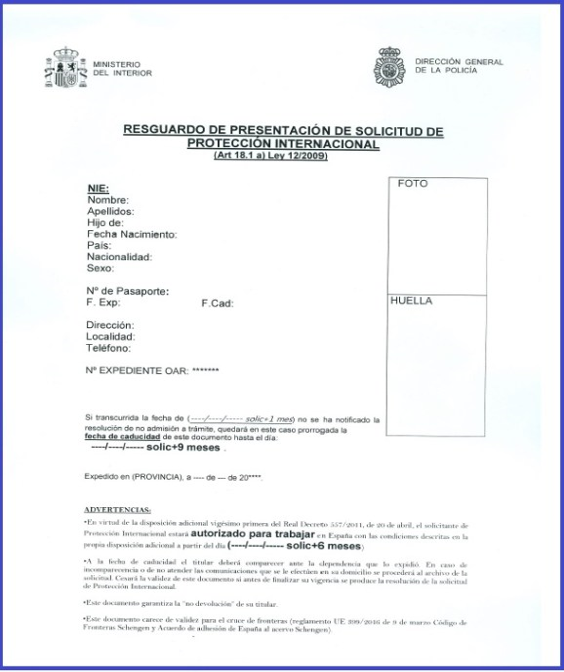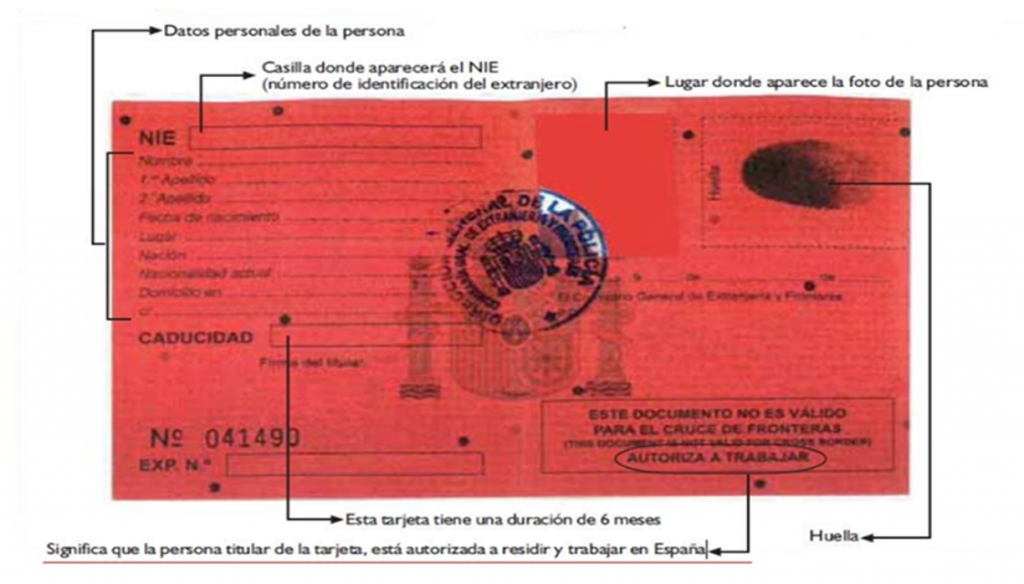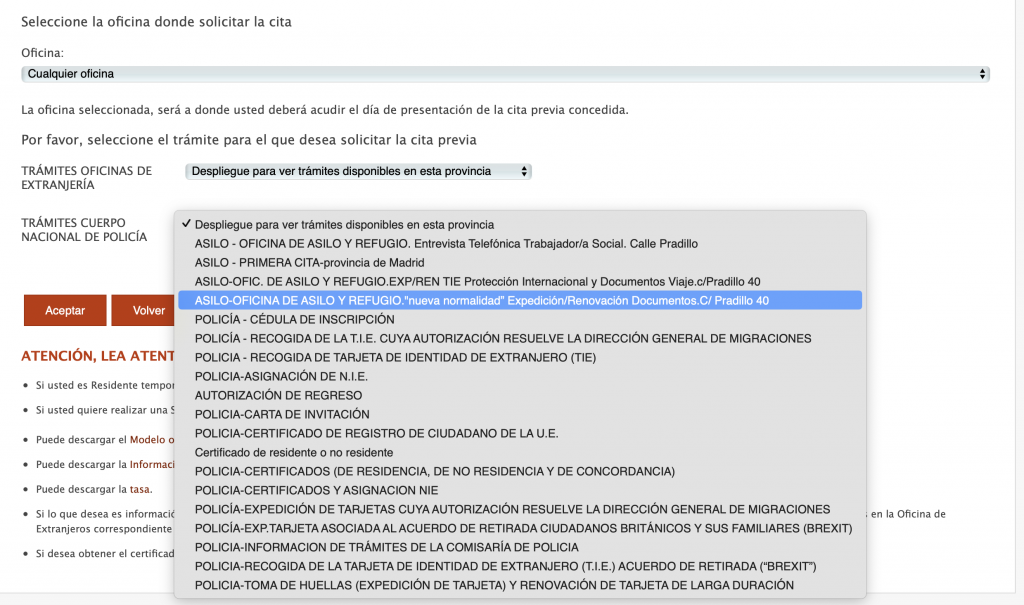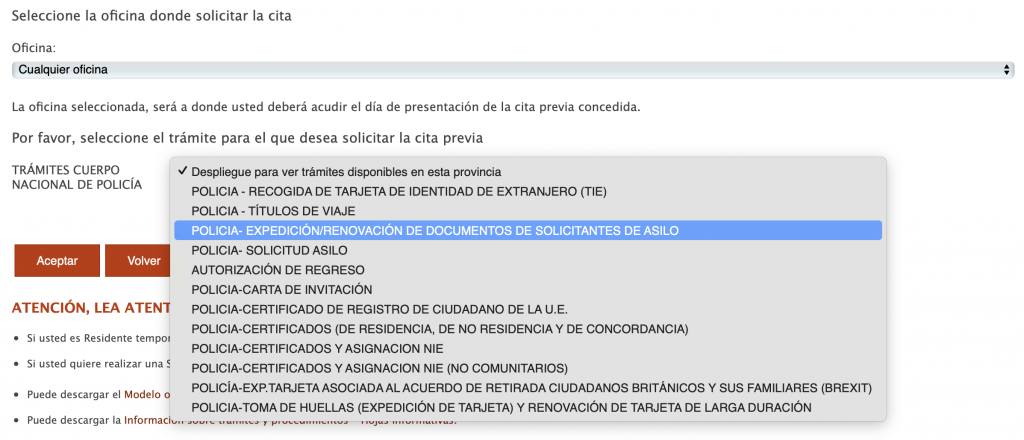Attention! Changes have been made to the process of obtaining an appointment for asylum applications in Spain.
Remember! The entire asylum application process is free of charge, including the appointment request.
IMPORTANT INFORMATION! ONLY CALL OFFICIAL NUMBERS
Fraudulent charges associated with calls made to premium rate numbers have been detected. Specifically, cases have been reported in which, through the phone number enabled by the National Police, users are redirected to numbers such as 11821 to request asylum appointments by telephone.
It is not possible to obtain an appointment through these numbers. The call starts and ends without being able to establish contact with anyone.
If when calling an official phone number you are redirected to the number 11821 or another unofficial number, you could be subject to fraudulent automatic charges.
You may obtain general information regarding the reasons for which you can request asylum and how to begin the request for asylum process in Spain in this video. The information is available in Spanish, English, French and Arabic. Hereinbelow, we will provide more detailed information.
To request asylum within Spain, you must follow these steps:
1. Request an appointment to formalise your asylum application
Attention! Since March 2023, changes have been made to the process of obtaining an appointment for asylum applications in Spain.
These changes do not affect all provinces. You can review updated information provided by the National Police on how to obtain an appointment in each province on this official website.
Regarding the provinces with the highest number of applications, according to the available official information, the way to access the asylum procedure is as follows:
- Madrid: Tel. 913 22 01 89/913 22 01 90, Opening hours: Monday to Friday, from 9:00 a.m. to 7:00 p.m., or until all appointments are booked.
- Barcelona: Tel. 932 90 30 98, Opening hours: Monday to Friday, from 8:30 a.m. to 11:30 a.m. until all appointments are booked.
- Valencia: Tel. 649 49 76 59/606 72 89 40, Opening hours: Wednesday from 3:30 p.m. until all appointments are booked.
We remind you that the UNHCR in Spain does not intervene in the appointment process or the registration of asylum applications, as this is the exclusive responsibility of the Spanish authorities.
What do I have to take with me to the appointment?
- Passport or other documentation that proves your identity (if you hold it).
- 2 passport size photos with white background.
What are the consequences of requesting an appointment?
The request for an appointment does not formally initiate the procedures for international protection, or the date from which a response must be legally provided. This is initiated when you formalise your asylum application by means of an interview.
Your appointment will be registered by the Police and, in certain areas, you will receive a document that proves you have requested an appointment to apply for asylum. In any event, from that moment in time, you will be protected and you won’t be able to be returned to your country of origin.
2. Register your request for asylum
During this initial appointment with the Police, your intention to request asylum shall be registered and you will be issued with a document called “Declaration of Intention to request international protection”. This document, although it does not represent the beginning of your asylum application or of the applicable legal periods, protects you from being expelled from Spain and enables you to be identified before the Spanish authorities. The “Declaration of Intention” will be valid until the date on which you formalise your asylum application (that is explained in the following paragraph). During this appointment, you will be given an appointment for the formalisation of your asylum application.
3. Formalise your asylum application (asylum interview)
The formalisation of your asylum application in Spain is carried out by means of an individual interview. The interview is conducted by a police officer.
During the interview, before asking you for the reasons why you want to request asylum, you will be asked to identify yourself (name, surname(s), date and place of birth, etc.) as well as detailed information regarding your personal circumstances and regarding your trip to Spain. You will be interviewed so that you can explain the reasons that have led you to request international protection in Spain, in particular the reasons for leaving your country of origin and/or why you personally are not able to return there.
You will also be asked for information regarding your family (name, surname(s), family relationship or kinship, etc.). It is very important that this information is clearly recorded in the asylum application so that, if you are granted protection in Spain, you can request family reunification (family members may reunite with you in Spain).
The content of the asylum application is confidential. Everything that you mention in the interview and all the documentation that you provide, will not be communicated to the authorities of your country of origin, or any other person that is not involved in the procedure.
The asylum application of each one of the members of the family that are over the age of 18 must be formalised separately, by way of individual interviews.
What do I have to take with me to the interview?
- Passport or other documentation that proves your identity and nationality (if you hold it). If you do not present any documentation, you can explain why you don’t hold any identification documents. The lack of documentation does not prevent you from being able to request protection. If you obtain a document that proves your identity and nationality in the future, you must provide them.
- 2 passport size photos with white background
- Documentation: Documents, photographs and other evidence that supports your case and that helps to demonstrate what has happened to you in your country of origin. You may also provide probative documentation subsequently, throughout the procedure. If you do not have any documents or evidence that supports your story, you may request asylum based upon your own story, explained as best you can and with as much detail as possible.
- In the case of requests for asylum with dependent children, you will be requested, if you can, to provide the documentation that proves your family relationship (family record books, birth certificates, etc.)
Under no circumstances whatsoever should you be requested to provide any other documentation or comply with any other requirement in order to be able to request asylum. If, in any circumstances, you have been requested any other document, contact your lawyer or request an appointment with a lawyer of the specialised NGOs in order to clarify such situation.
Do I have the right to a lawyer?
Yes, you have the right to receive legal aid free of charge. You may receive legal aid from the lawyers that work for the NGOs specialised in asylum and refuge, or alternatively from a duty shift lawyer from the Bar Association of the province in which you are situated.
Furthermore, if you want, you may also contact a private lawyer directly, although in said situation you will have to negotiate the terms and conditions and the cost of the services directly with this professional.
For further information about how to obtain legal aid free of charge, visit this section.
I don’t speak Spanish, what can I do?
If you do not speak Spanish or if you do not feel comfortable speaking it, you have the right to request the services of an interpreter free of charge. The interpreter will help you to communicate throughout the whole interview and must respect the duty of confidentiality, which means that the interpreter may not share information about your history or your case with anyone.
If you think you will need an interpreter, you must request this service from the police officer at the time at which you request the appointment to initiate your asylum application.
What happens after the interview?
When you finish your interview for asylum you will be given an identification document that is known as “HOJA BLANCA” (WHITE PAPER). This document is the Filing Receipt of the Request for International Protection (or receipt of your request for asylum) and is a valid document in Spain, also valid for carrying out any subsequent interview or administrative procedure.
The law establishes that the OAR (Asylum and Refugee Office) must decide within the period of one month whether the asylum application will be processed (that is, if the request is accepted for analysis), or not. If the request is processed, it means that your case will be studied in detail to determine, subsequently, whether you will be granted international protection or not. However, in practice, all requests are automatically processed.
In the White Paper the Police will assign you a “N.I.E.” (Spanish Foreigner’s Identification Number) for your identification. The N.I.E. is comprised of a letter, 7 numbers and a verification code and helps the State to control the whole of the foreign population and also enables the foreign person to carry out administrative procedures and activities easier.

This document shall be valid until the expiry date thereof. You will see that there are two expiry dates mentioned in the document:
- The first is one month after the date of the request for asylum (date of the interview). During this first month, a resolution may be forwarded to you informing you that your case has not been granted leave to proceed. In this case, this document shall cease to be valid.
If, after the period of one month has elapsed, you have NOT been notified of a resolution that REJECTS you application, the White Paper shall continue to be valid until the second expiry date set out in the document.
- The second expiry date is that of 9 months after the date of the request for asylum (date of the interview). This is the expiry date of your document if your request has been granted leave to proceed and you have not been notified of a resolution that rejects the application.
Moreover, after the period of 6 months is over, after the date of the asylum application (date of the interview) you will be authorised to work in Spain, as set out in the White Paper.
4. Processing of your asylum request
After the interview for asylum has been carried out, the application shall be processed and studied and in order to determine whether you meet the requirements to obtain any type of international protection.
If you receive a notification during the first month after the date of the request for asylum that notifies you that your case “NO ha sido ADMITIDO A TRÁMITE“, it means that your case has been rejected and shall not be studied in detail. In this case your request will have concluded, although you may file an administrative or legal appeal requesting the review of your case. For this purpose, we recommend that you speak to your lawyer, that shall help you, free of charge, in relation to the steps to take to fill such appeal.
If you do not receive any notification during the first month after the date of the asylum application, this means that your request has been accepted and shall be studied in detail and the Spanish State will provide a final response on whether you will be granted international protection or not.
5. Request an appointment to renew your documentation or "White Paper" (“Hoja Blanca")
At the appointment for the renewal of your “Hoja Blanca” (White Paper) or Filing Receipt of the Request for International Protection, you will be issued with a new identification document: the “TARJETA ROJA” (RED CARD). This card replaces the “Hoja Blanca” (White Paper).

Where and how do I request an appointment to renew the “Hoja Blanca” (White Paper) or Filing Receipt of the Request for International Protection?
When the expiry date of your “Hoja Blanca” (White Paper) is close, you must request an appointment via the internet for the renewal of your document via this link.
Through this website, you must select the province where you reside and search for the renewal procedure. If, in the province in which you reside, the option for requesting an appointment online does not exist, you must seek information about how to carry out the renewal by contacting a lawyer specialised in asylum or via an NGO specialised in asylum.
- MADRID:“ASILO – OFICINA DE ASILO Y REFUGIO. Expedición/Renovación de documentos. Calle Pradillo” (ASYLUM – ASYLUM AND REFUGEE OFFICE. Issue/Renewal of documents. Calle Pradillo”

- BARCELONA:
-
- Click on “Expedición/Renovación de Documentos de Solicitantes de Asilo” (Issue/Renewal of Documents of Asylum-Seekers):

- OTHER PROVINCES: If in the province in which you reside you may not request an appointment online, you must contact a lawyer specialised in asylum or an NGO.
Communication with the Asylum and Refugee Office (OAR)
To provide documentation or to obtain information regarding the status of your international protection or stateless procedure, you must file a written request before an administrative register. We recommend that you carry out this procedure through a specialised lawyer. You may obtain further information regarding the administrative registers via this link.
To send a written request to an official register, you must follow these steps:
- Find an office with administrative register services. You may locate the closest office via this link.
- File a written request addressed to the “Subdirección General de Protección Internacional” (Sub Directorate-General for International Protection) providing the documentation or requesting information regarding the status of your application. The office will register your written request and will return the original to you together with a filing receipt.
- In the case that you request information regarding the status of your application, the OAR (Asylum and Refugee Office) will contact you through the contact details set out in your file.
